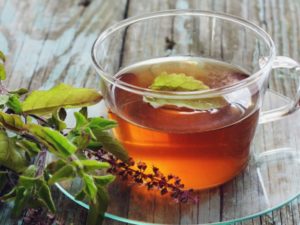Tulsi plant the queen of herbs has lot of medicinal uses. It has a high nutritional value and works as a great health supplement to keep body healthy and fit. Tulsi known for its health benefits and is an excellent choice, when it comes to preventing infections.
Tulsi plant has antifungal, antiviral, and antibacterial properties, which make this herb an excellent choice, when it comes to preventing infections. Holy basil also known as Tulsi, is an easily found plant in India. It is known to be an age old ingredient. It has a high nutritional value and works as a great health supplement to keep body healthy and fit.
English name: Holy Basil
Botanical name: Ocimum sanctum
Kannada name: Thulasi
Tamil name: Tulsi
Medicinal uses of Tulsi plant:
1.Diabetes mellitus: If you are suffering from type 2 diabetes, then adding tulasi to your diet can help to alleviate the symptoms of diabetes, as it helps in regulating your blood sugar levels. First in the morning, take 10 ml of tulsi juice by adding three to four drops of ginger juice with it.
Note: Keep monitoring your blood sugar levels periodically.
2.Arthritis pain: Tulsi plant is known to have anti-inflammatory properties and is packed with antioxidants which aid in relieving joint pain and inflammation of any kind. Drink a cup of tulsi tea with honey. Apply tulsi oil daily before sleep over the painful area.
3.Digestive issues: Tulsi has a soothing property and can help sooth your stomach and digestive system. It can improve your gut’s health and also reduce the side effects of stress-induced stomach ulcers. An alcohol extract of tulsi leaves(eugenol) at a dose of 50-200mg/ kg twice daily for 5 days orally was a dose-dependly protective against some types of stomach ulcers.
4.Healing property: Holy basil has been used to treat wounds infections over the years. It is known to have antibacterial, antiviral, antifungal and analgesic properties as well as anti-inflammatory properties. It accelerates the process of healing and pain. You can also use it to treat throat infections, acne and mouth ulcers. Crush the Tulsi leaves with pepper or salt or honey (if necessary) and can apply directly to the wounded area. Drink tulsi tea daily with honey.
5.Skin infections: If you have healthy skin, and often end up dealing with skin problems and infections, some tulsi can help you detoxify the skin and keep it clean and healthy and make you free from skin infections. Direct application of tulsi leaf paste or Mix 2 part of aloe Vera gel with one part of tulsi leaf paste and apply over the face or Tulsi leaf paste in case of any infections.
6.Enhances immunity: Tulsi is abundant in zinc and vitamin C, both components that help in fight off infections. Having tulsi extract in the form of tablets or drops or directly using the tulsi leaves ensures to boost your immunity.
7.Reduces fever: Tulsi reduces body temperature. So it is beneficial during fever. It has antibacterial and anti-viral properties that helps in fighting off the infections. This leads to gradual decrease in fever.
8.Good for respiratory disorders: The essential oils and other components in tulasi like camphene, cineol, eugenol helps to reduce congestion in the chest. It is beneficial in treating acute and chronic bronchitis and improves respiratory health. It is also effective against asthma. Tulsi has been known to heal the damage caused by pollution, smoking, tuberclosis and even can prevent lung cancer. Apply thulasi oil mixed with camphor at niight before sleep.
9.Good for the heart: Tulsi reduces the cholesterol level in our body. It protects the heart and from the harmful effects of free radicals and environmental damage.
10.Stress buster: Having tulsi everyday has been known to reduce stress. It also calms the nerves and lowers blood pressure. It’s anti-inflammatory properties helps to reduce inflammation and it repairs the damage caused by free radicals.
11.Good for kidney health: Tulsi detoxifies the body and has diuretic properties. It decreases the level of uric acid in the body, which is the main reason why kidney stones are formed. It increases the frequency of urination thus helps maintain the renal health. Drink a glass of water by adding tulsi leaves and a teaspoon of falooda seeds.
12.Relieve headache: Tulsi lowers blood pressure and helps fight off infections, combats cough and cold all the common reasons why headache occurs. It is very beneficial for those who suffer from migraine and sinusitis. Take a steam inhalation for 10 minutes with tulsi leaves.
13.Antiviral activity: Apigenin, a compound derived from the tulsi leaves, has shown effectiveness against H1N1 infection and swine flu. An alcohol or solvent based extract of tulsi inhibits the genital herpes (herpes simplex virus). An aqueous extract of tulsi leaves prevent the cell damage and the growth of Newcastle disease virus in chickens. Drink tulsi tea by adding 1 teaspoon of pepper powder and turmeric.
14.Graying the hair: Tulsi increases the catalase, an enzyme that breaks down hydrogen peroxide and keep hair from graying-purely speculative potential benefits.
Preparation methods:
1.Boil water in a pan, add 10 to 12 tulsi leaves, one teaspoon of grated ginger and 7-8 black pepper. Boil for 10 minutes. Add a pinch of black salt and squeeze 1/2 lemon to it. Let it stand for one minute. Strain and drink warm to control common cold and cough.
2.Take the juice of tulsi leaves and mix it with 1tspn of honey.Consume 3 to 4 times daily to get relief from asthma.


3.Take 10 to 12 tulsi leaves and add it to 2 cups of water. Boil it in a pan till the volume reduces to half a cup. Allow it to cool to room temperature and strain the mixture. Drink by adding one teaspoon of honey before sleep to get rid from insomnia fear and irritation.
Precautions:
1.Pregnancy: Holy basil possibly unsafe during pregnancy or when trying to become pregnant. Because of uterine contraction is it may cause abortion.
2.Breastfeeding: Not enough is known about the use of holy basil during breastfeeding. Stay on the safe side and avoid the use.
3.Diabetes: Holy basil might lower blood sugar levels. This might interfere with controlling blood sugar levels. People with type 2 diabetes may need to adjust dozing for insulin or antidiabetic drugs.
4.Hypothyroidism:People with hypothyroidism have low levels of thyroid hormone called Thyroxine. Holy basil might lower the thyroxine levels. So holy basil might worsen hypothyroidism.
5.Surgery: Holy basil might slow blood clotting. So there is a concern that it can increase the risk of bleeding during and after surgery. Stop using basil at least two weeks before a scheduled surgery.


Dr Venkataramana Hegde
Veda wellness center
Nisarga Mane Sirsi
Uttarakannada District
Ph: 9597019032/ 9448729434
Email : nisargamane6@gmail.com
Dr. Nandhini V mohan
NVM DIET AND LIFESTYLE CLINIC
Assistant professor and medical officer
Annai college of naturopathy and yoga science
kumbakonam, Tamilnadu.
Watsapp-9597019032 (Online consultation available)
Email: nandhinimohanbnys@gmail.com











